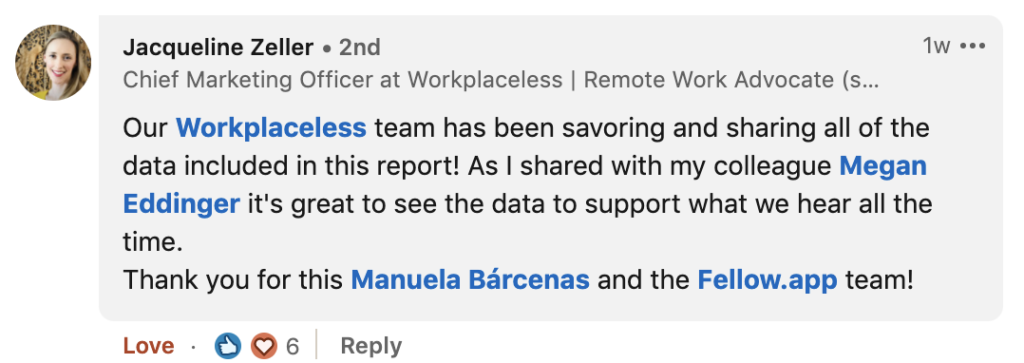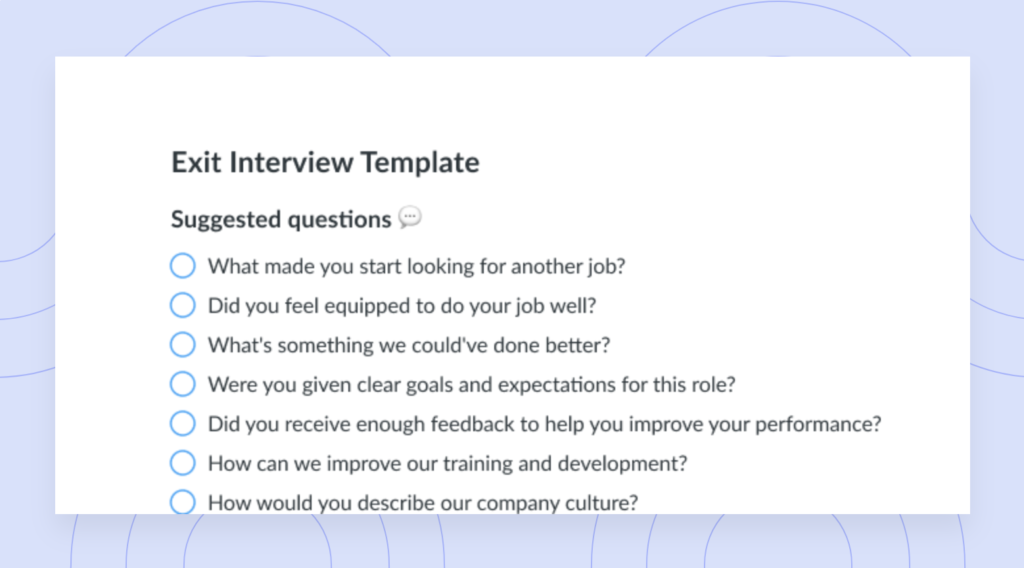Hey fellow managers and leaders,
It’s great to see that many of you have downloaded the Future of Meetings Report and shared the takeaways with your teams. We’re glad that it’s helping you run productive meetings!

If you haven’t downloaded the report yet, you can do so here. And of course, feel free to share your thoughts on social media!
Now, back to the usual programming. This week we’re talking about employee resignations, emotional intelligence, psychological safety, and performance reviews…
😳 “I Quit!” How to Tactfully Handle Employee Resignations? (9 min read) | Fellow Blog
TLDR: Your employee just quit. It’s terrible timing. You’re not sure when you’re going to have time to fit in interviews, onboarding, and training. You’re worried about putting extra work onto the other staffers, and you really just want to scream into a pillow. Now what?
- Congratulate the employee on the new opportunity and let them know that you will miss having them on your team.
- Develop a transition plan (also known as an off-boarding plan) and discuss it with the departing employee to see if they have anything to add before sharing it with the team.
- Schedule an exit interview with the employee with the goal of understanding what the employee felt were the best parts and the worst parts of the job.
“Having an employee quit suddenly can indeed seem like a slap in the face and one more thing on the very long list of things you need to deal with – but it is important for the well-being of your remaining team, your reputation, staff morale, workflow, and even the mindset of that departing employee, that you keep your cool, follow the steps, and handle the resignation with tact and grace.”
🌱 Navigating Engineering Performance Reviews (13 min read) | Lead Dev
TLDR: “But I thought I was getting promoted this cycle”… this is what Smruti Patel, Head of Engineering at Stripe, heard from a direct report a decade ago, without knowing why the employee was disappointed. Since then, Smruti has developed a playbook to share performance feedback and set clear expectations, ensuring that performance reviews aren’t a surprise for the team.
- Onboard with structure and intent. Break down goals into a 30-60-90 day format, which focuses on learning, discovery, relationship-building, and impact.
- Drive alignment by setting clear expectations. For each individual, pick one or two top wins that they’d like to achieve over the next term in the form of key results or success metrics.
- Provide ongoing mentorship, coaching, and feedback. Leverage regular 1:1s, or the preferred medium of feedback, to call out what’s working well and what needs to change, early and often.
“When we step back, we can see that navigating performance reviews requires understanding the systems of systems: the factors and the frameworks that can help foster growth and learning. As a leader, supporting yourself, your peers, and your team effectively through these provides you the highest leverage for building, empowering, and growing high-performing teams.”
🧠 Emotional Intelligence in the Workplace: A Guide for Leaders (7 min read) | Fellow Blog
TLDR: Research shows that emotional intelligence is the “sine qua non” (without which, not) of leadership. Without it, a person can have the best training in the world, an incisive, analytical mind, and an endless supply of smart ideas, but they still won’t make a great leader. Here are three tactical ways to foster EQ in your team:
- Work on your own self-awareness. This means, not only are you able to think about how others are feeling, but you can understand your feelings, too. [Personally, journaling has been a great way to understand my emotions].
- Learn conflict resolution. Remember that conflict is natural and happens in every relationship. Listen actively and be a calming agent.
- Show empathy towards your colleagues. If a team member seems to be upset or having a bad day, don’t ignore their feelings. Simply asking them if they want to talk can go a long way.
“The most effective leaders are all alike in one crucial way: they all have a high degree of what has come to be known as Emotional Intelligence. It’s not that IQ and technical skills are irrelevant. They do matter, but…they are the entry-level requirements for executive positions.”
🚀 What do Psychologically Safe Teams Look Like? (11 min read) | Harri Kaloudis
TLDR: Think for a moment about the team you are a part of. Do people feel comfortable asking about things they don’t understand? Do people feel comfortable raising difficult issues? What happens when someone makes a mistake? This article offers insights on how to build psychologically safe teams:
- Report and record mistakes, near misses, critical incidents, and failures honestly and transparently. When mistakes happen, take the time to discuss them candidly and frame them as opportunities for learning.
- Avoid giving the final word to the ‘person paid the most’. Instead, encourage ideas from all team members and foster open, thoughtful and inclusive debate.
- Seek the opinion of colleagues from other teams. In psychological safe organizations, team members give feedback to one another frequently.
“A team feels psychologically safe to its members when they share the belief that within the team they will not be exposed to interpersonal or social threats to their self or identity, their status or standing and to their career or employment, when engaging in learning behaviours such as asking for help, seeking feedback, admitting errors or lack of knowledge, trying something new or voicing work-related dissenting views.”
🎙New on the Supermanagers podcast
We interview leaders from all walks of life to tease out the habits, thought patterns, and experiences that help them be extraordinary at the fine craft of management.
Episode 44: Joe Martin, VP of Marketing and Strategy at CloudApp, shares tips to write resumes that stand out and the idea of an “async week”.
Episode 45: Russ Laraway, Employee Experience Evangelist at Qualtrics, shares how you can build a coaching culture, lead by example. and welcome dissent.
🗒Meeting Template of the Week
You don’t have to start from scratch. We’ve distilled everything you need to know about meetings into ready-to-use templates.
Exit interview template
Gather honest feedback about company culture, team morale, and your management style by asking departing employees these exit interview questions.









